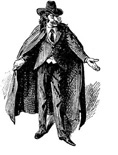
Is Opposition to Homosexual Activity “Irrational”?
AN ARGUMENT FROM NATURE
If there is one thing our cultural elite seems to agree on, it is that there cannot possibly be any rational reason for opposing the legitimization of homosexual conduct. Let me bring forward a few choice samples of their pronouncements. Writing in the Report from the Institute for Philosophy and Public Affairs (Winter 1996) at the University of Maryland, David Luban says,
The problem is that many of their [i.e., orthodox Christians’] favorite policies simply don’t have a plausible secular basis. Opposition to gay marriages offers an illuminating example. The Christian Right opposes gay marriage because it finds homosexuality sinful, basing this judgment on Scriptural authority.
And he goes on to say,
Of course, some non-religious people also oppose legalizing gay marriage, because they find homosexuality revolting. But mere public prejudice is never an adequate reason for discrimination, any more than the fact that some people find interracial marriage revolting is an adequate reason for anti -miscegenation statutes. Apart from public prejudice against gay marriage, there are no secular reasons to forbid it, only religious reasons.
The U.S. Supreme Court, in its recent decision in Romer v. Evans (May 20, 1996), said much the same thing: The amendment to the Colorado Constitution which it struck down “seems inexplicable by anything but animus toward the class that it affects; it lacks a rational relationship to legitimate state interests.” And in a discussion of this case by a group of lawyers (Legal Times, May 27, 1996), one of the participants said, Unless some specific harm from [homosexual] conduct is demonstrable, the widespread social aversion to those who practice it is no more than a matter of religious faith, and hence not supportable except by appeal to the authority of the sacred text.
You May Also Enjoy
The completeness of Catholic conformity to the biblical blueprint is nothing less than astounding.
Gregory Wolfe says he came to discover that modernity is more "complex" than he had thought.

